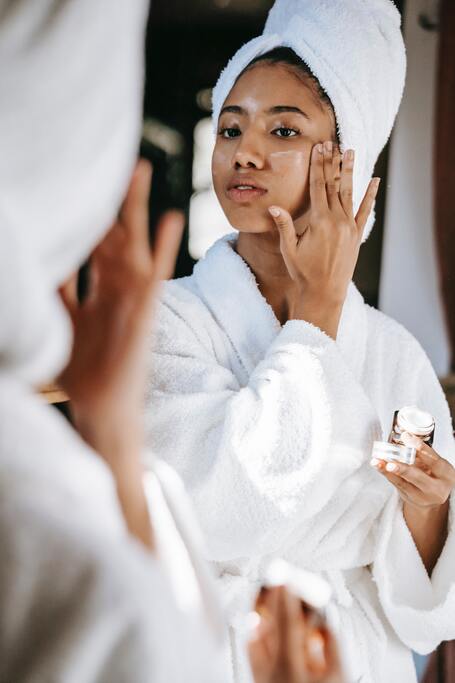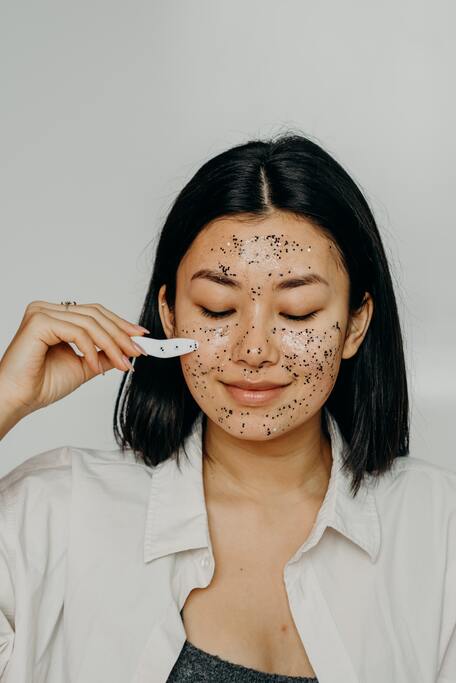As the winter season approaches, many of you may wonder: “How can I have healthy winter skin?”. Your skin might have it difficult during the winter. Our skin can feel dry and tight when the temperature drops and the humidity level drops. Because of this, it’s crucial to have a winter skincare routine that nourishes dry skin and keeps our complexions healthy and radiant. You can maintain gorgeous skin throughout the season with the correct products and a few easy tips.
Top 4 tips for healthy winter skin
Moisturize immediately after washing
Your skin loses its natural oils whenever you wash your hands, face, or body. Replace these oils frequently since they aid in retaining moisture. Because of this, it’s crucial to hydrate your skin after every wash, especially in the winter. After applying moisturizer, you can put on cotton gloves to assist your skin absorb the lotion.

Try keeping a moisturizer bottle close to your sink as a useful reminder and carrying a travel-size moisturizer with you while you’re out and about. By making an investment in a high-quality humidifier, you can ensure that your house and skin remain moist during this winter. Use a humidifier in the areas of your home where you spend the most time, particularly your bedroom, to provide moisture to the dry winter air and maintain the moisture level of your healthy winter skin.
Remember to use sunscreen even on gray winter days
The Skin Cancer Foundation states that on sunny winter days, snow reflects the sun’s rays, increasing your exposure to UV radiation. According to the American Cancer Society, UV radiation has been linked to skin cancer, sunburns, and early aging of the skin (including wrinkles, leathery skin, and liver spots).

Moreover, don’t be misled by the shorter, gloomier days of winter. According to the Skin Cancer Foundation, up to 80% of the sun’s dangerous UV radiation may penetrate clouds and still do harm. Applying sunscreen in the sweltering winter months is just as crucial as it is in the summer, whether you’re out skiing, playing in the snow, or doing errands across a parking lot.
Use a broad-spectrum sunscreen to all exposed regions of your body with an SPF of 30 or higher, water resistance, and moisturizing elements like lanolin or glycerin before going outside.
Drink lots of water to stay hydrated
While moisturizing your skin is important to avoid dry skin, it is even more important to hydrate your skin from within. Remember, you’re 60 percent water, and every system in your body requires it to function, so it only makes sense that you need to obtain lots of water from drink and food every day. Keeping hydrated aids in detoxification, wrinkle reduction, and oil balance on the face.

Studies have shown that dehydration may have an adverse effect on your energy levels, intellect, and emotions. It can also have a detrimental impact on your mood and mental health. How much water you require ultimately depends on a variety of factors, both internal and external. Everyday fluid consumption of at least 2.7 liters, or 6 to 8 cups or glasses, is advised.
But, since your body would quickly eliminate it, you shouldn’t consume it all at once. To genuinely achieve the finest results for glowing skin in the winter, continue to space out your water intake throughout the day so that your body can absorb the most of it.
Use exfoliants and scrubs sparingly.
Exfoliation, which helps remove dead skin cells from the skin’s surface, can help maintain the smooth, youthful appearance of healthy winter skin. Nevertheless, if you exfoliate your skin too frequently or with the incorrect products, you risk overdoing it.

It’s okay to exfoliate your skin once per week since this promotes skin regeneration and improves product absorption. Also, depending on your skin type, you should exfoliate. Lightly exfoliate your skin if you have really dry skin. Once a week is sufficient if you have mixed and oily skin.
Consider using a light chemical exfoliator rather than a physical scrape if your skin appears dry or flaky. Scrubs with larger particles that are harsher may have a higher chance of damaging your skin’s moisture barrier. It can be advisable to wait until your skin has healed before exfoliating if it is cracked, raw, or irritated.

